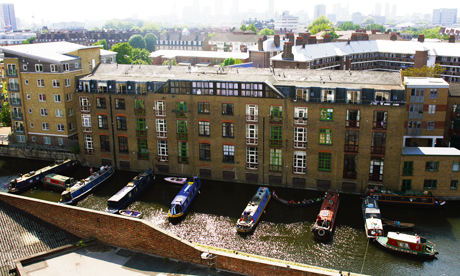Boaters campaign to stay afloat

Narrowboats and rowboats arranged on the Regent’s Canal near Broadway Market to spell out the word ‘HOME’. Photograph: Hackney Citizen
A community of local boaters came together on Saturday 30 April to draw attention to the impending threat to their way of life. They arranged their boats to form the word ‘home’ in Regent’s Canal in protest at plans by British Waterways to change the charges that some boaters in the Lea Valley area pay.
A troupe of boat-dwelling artists from Collectif and then…circus theatre also staged a live performance of trapeze art and clowning whilst other members of the community collected signatures on a petition opposing the changes.
Many of those who live afloat ‘cruise’ from place to place; with permanent residential moorings costing up to £10,000 a year or more, a nomadic way of life is the only option for some. Under the new rules, the Lee is divided into four ‘neighbourhoods’ and those with Continuous Cruiser licences will be not be able to spend more 14 continuous days or more than 61 days a year in any one neighbourhood. If they break this rule they will be subject to charges of £40 a day (£20 if paid in advance or on the day).
The boaters argue that the new regulations will destroy their community and make it very difficult for many of them to continue to live on the water.
Isabelle Rodker, who has lived afloat for a number of years, says: “you step onto the waterways in London and you go into a different world. People live much more simply. This is a special way of living, a low-impact way.
“The new rules will force many people to give up their homes, as it will be very difficult to sustain a life in London. Many boaters work in London and would have to begin enormous commutes. Boaters who have children in local schools would either have to uproot their families or give up their boats.”
Fellow boat-dweller Jon Pook believes that the new proposals infringe the boaters’ human rights. “When you start making it difficult for people to get their kids to school and get to work, then you are getting into a human rights grey area”.
Pook also fears that the new regulations could endanger the electoral rights of continuous cruisers. Under electoral law, a person without a permanent residence has to demonstrate a ‘local connection’ with a particular constituency in order to be included on the electoral register, and it is unclear whether someone who lives only sporadically in a constituency would qualify.
British Waterways argues that the capital’s canals and rivers suffer from over-congestion, and the new measures are designed to lessen this problem. The consultation document outlining their plans notes that one of the reasons the River Lea/Regent’s Canal area has been singled out for special measures is because: “Research has indicated high demand for visitor moorings during the 2012 Olympics, particularly along the Regent’s and Hertford Union Canals; during the summer of 2012, BW (British Waterways) will be offering reserved berths along the towpaths in these locations and also on the lower reaches of the Lea”.
Many of the boaters disagree that congestion is a serious problem, pointing out that there are long stretches of canals with very few mooring pins. Some also feel that the new measures are partially designed to ‘cleanse’ the waterways in advance of the 2012 Games. Boater Mike Wells maintains that “the powers that be, including British Waterways, are out to destroy any kind of authenticity in our borough; authenticity is the enemy of the Olympics.”
In a statement, British Waterways said: “As part of a consultation on proposals to introduce a new moorings management plan for the River Lee, River Stort and the Hertford Union Canal, British Waterways has been calling upon local authorities, residents, boaters and all who use the waterways to send in their responses. The plan was drafted in response to the increased number of boats mooring in the area – an increase of nearly 40% over the past four years.
“To date, British Waterways has had an excellent response to its on-going consultation. However in light of events, most significantly the spate of public holidays and the local government elections, British Waterways has decided to extend the deadline to Tuesday 31 May to ensure that all interested parties have ample opportunity to respond.”
The draft proposals were published for public consultation on 15 February and can be downloaded here (external site).
